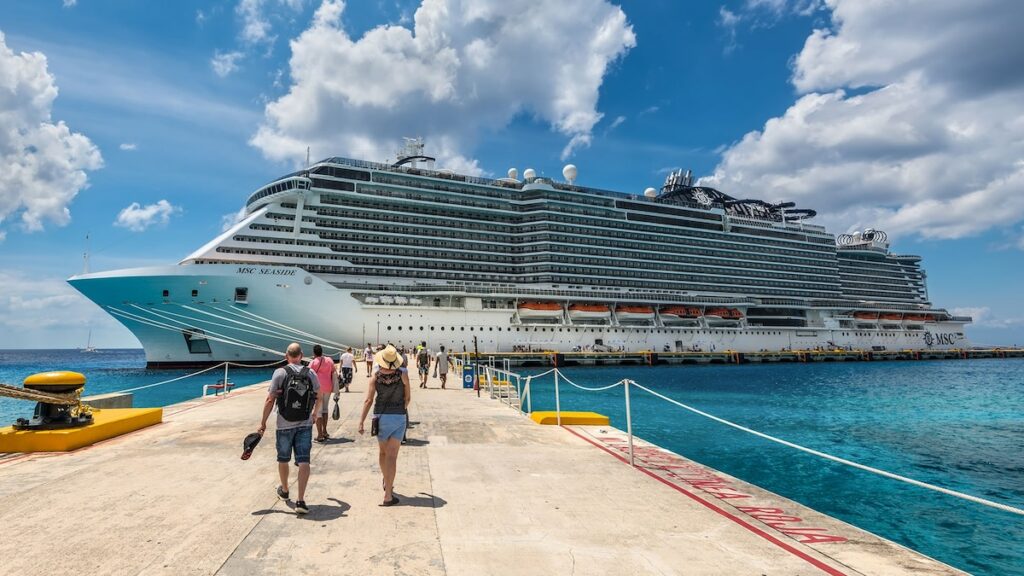Cruise ships are well known incubators of gastrointestinal illnesses. The Center for Disease Control and Prevention (CDC) even offers a helpful database of cases, broken down by year.
Although the vast majority of cruises don’t experience any problems, confined spaces mean that even one sick person can create a serious situation, explains Tullia Marcolongo, former executive director of the nonprofit International Association for Medical Assistance to Travelers. “It’s the domino effect, and you have nowhere to go,” she says.
Health officials in protective gear remove suitcases from the Diamond Princess cruise ship in Yokohama, Japan, in this February 2020 photo.
Photograph by Asahi Shimbun, Getty Images
What cruise companies do to minimize risks
Cruise companies work to minimize the risk of illness by maintaining cleanliness and monitoring health on board their ships. Since the COVID-19 pandemic, Carnival Cruise Line has introduced expanded protocols, including “enhanced onboard sanitation measures with non-toxic materials” and “pre-boarding medical evaluations, as needed.” On its website, Royal Caribbean Cruises touts its health and safety program, such as internal and external inspections, frequent water systems testing, and strict food handling rules.
How to protect your health onboard
Passengers can do their part, too. “The first thing I would say is that the power is in your hands,” Marcolongo says. She means that literally. Frequent hand washing can be a critical preventative measure for norovirus, colds, and other yucky things circulating on a ship. To make sure you scrub long enough, sing “Happy Birthday” twice, she suggests, and don’t miss the spots between your fingers. If there’s no soap and water nearby, use an alcohol-based hand sanitizer. Many ships make sanitizer stands readily available to passengers, Marcolongo adds.
David Parenti, an infectious disease specialist in Washington, D.C., advises being aware of when you’ve held handrails and touched other surfaces. Until you can wash your hands, don’t stick them in your eyes or mouth.
Unfortunately, Parenti says, there are lots of other ways to get sick, both on ship and on land. “It all has to do with luck. If you’re on a ship with norovirus, that’s bad luck. If you are on a cruise ship, you will need to eat. Those risks are something you don’t have a lot of control over,” he says.
(This is where you should sit on the plane to avoid getting sick.)
Give yourself a pre-cruise check up
To be proactive, travelers can set up a pre-vacation doctor’s appointment to make sure their immunizations are up to date. Depending on your destination, that flu shot might be important even if you’re taking off in the middle of the summer. “Keep in mind that the U.S. influenza season is the opposite of the Southern Hemisphere,” Parenti notes. He recommends getting the vaccine for Hepatitis A and checking on your immunity to measles; you could possibly use another shot.
Because of the limited number of medications on board, it’s smart to pack whatever you think you might need, Marcolongo adds. That includes first-aid basics as well as some standard over-the-counter supplies, which for gastrointestinal issues include Loperamide (Imodium) and oral rehydration salts.
Miami-based attorney Jack Hickey once represented cruise companies—and now sues them over personal injury claims. His advice? “What I tell people is get trip insurance and make sure it covers an air ambulance.” Travelers who experience emergencies and need to pay for transportation will be in for some serious sticker shock otherwise.
If you do get sick
Be realistic about what kind of care you can actually expect on board a ship. “If you get sick or injured, get back to the U.S. as quickly as possible,” Hickey advises. Although cruises undoubtably excel at hospitality, he says, they tend to be lacking when it comes to medical care. “It’s not a hospital, but a ship carrying 3,000 to 6,000 people and going to isolated areas of the world,” says Hickey, who thinks there typically aren’t enough doctors and staff to handle a heavy workload, and that the facilities aren’t adequately equipped. “Almost uniformly, they have X-ray machines. But [ships] do not have good machines or people who know how to read films well,” he says.
A cruise quarantine—which can keep people cooped up in tight cabins for weeks—is a reminder that mental health problems could also arise, especially for anyone with issues around anxiety or claustrophobia. “Travel insurance doesn’t necessarily cover that,” Marcolongo notes.
(Find out how air travel affects the body.)
As scientists learn more about the virus and how it’s transmitted, there may be more scrutiny of ventilation systems on cruise ships, Parenti adds. In a hospital, it’s possible to put a patient in a “respiratory isolation” room with frequent air exchanges.
That’s not an option for most cruise accommodations. The next best choice, according to Parenti? “I would take a window, personally.” At least you could open it and get a breeze that way.
Vicky Hallett is a Washington, D.C.-based writer specializing in family, travel, and health.
Editor’s note: This story was originally published on February 14, 2020. It has been updated.
>>> Read full article>>>
Copyright for syndicated content belongs to the linked Source : National Geographic – https://www.nationalgeographic.com/travel/article/how-not-to-get-sick-on-a-cruise-ship
